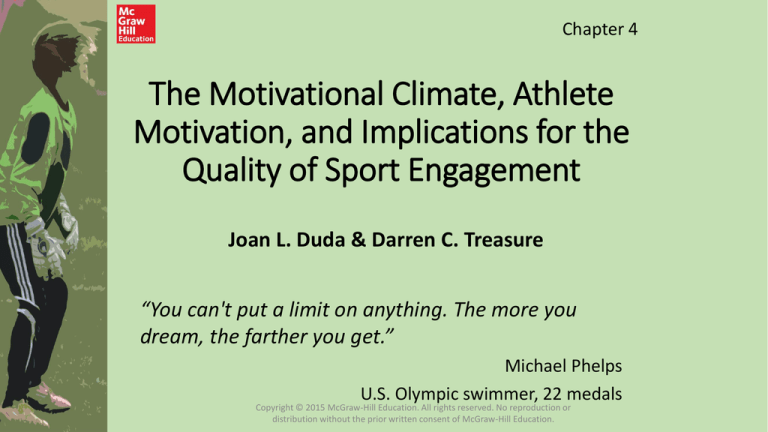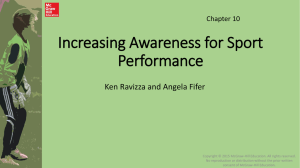
Chapter 4
The Motivational Climate, Athlete
Motivation, and Implications for the
Quality of Sport Engagement
Joan L. Duda & Darren C. Treasure
“You can't put a limit on anything. The more you
dream, the farther you get.”
Michael Phelps
U.S. Olympic swimmer, 22 medals
Copyright © 2015 McGraw-Hill Education. All rights reserved. No reproduction or
distribution without the prior written consent of McGraw-Hill Education.
Motivation
• The foundation of sport performance and
achievement
• Athletes can’t achieve full potential without it
• Complex and multifaceted
• Shapes how the athlete experiences and responds to
sport
• Often misunderstood
Copyright © 2015 McGraw-Hill Education. All rights reserved. No
reproduction or distribution without the prior written consent of
McGraw-Hill Education.
Motivation (cont.)
• Variable
• Depends on the diverse ways in which athletes interpret
their sport-related experiences
• Stems from behavioral patterns
Copyright © 2015 McGraw-Hill Education. All rights reserved. No
reproduction or distribution without the prior written consent of
McGraw-Hill Education.
Evaluating Motivation within an Individual
• Quantity of motivation
• How “into” the sport + how well she or he is currently
performing
• Quality of motivation
• Sustained positive engagement in sport
• Degree of enjoyment
• Psychological and physiological benefit associated with
sport involvement
• Both linked to how athletes think before, during, and
after sport experience
Copyright © 2015 McGraw-Hill Education. All rights reserved. No
reproduction or distribution without the prior written consent of
McGraw-Hill Education.
Theoretical Frameworks for Motivation
1. Achievement goal frameworks
2. Self-determination theory
Copyright © 2015 McGraw-Hill Education. All rights reserved.
No reproduction or distribution without the prior written
consent of McGraw-Hill Education.
Achievement Goal Framework
Perceptions of competence
(how able we think we are)
+
Differences in goal perspectives (ways
in which individuals judge their
competence and perceive success)
=
QUANTITY AND QUALITY OF OUR
MOTIVATION
Copyright © 2015 McGraw-Hill Education. All rights reserved. No
reproduction or distribution without the prior written consent of
McGraw-Hill Education.
Achievement Goal Framework (cont.)
• The result of both individual differences and
situational factors
• Two central goal perspectives govern the way athletes
think about achievement and guide subsequent
decision making and action:
• Task
• Ego
Fluctuate constantly!
Copyright © 2015 McGraw-Hill Education. All rights reserved. No
reproduction or distribution without the prior written consent of
McGraw-Hill Education.
Achievement Goal Framework:
Task Involved
• Athlete is focused on what he or she is doing and is
thinking primarily about how to accomplish the task:
•
•
•
•
Gain skills and knowledge
Exhibit effort
Perform at one’s best
Experience personal improvement
• If achieved, the individual feels competent and
successful
Copyright © 2015 McGraw-Hill Education. All rights reserved. No
reproduction or distribution without the prior written consent of
McGraw-Hill Education.
Achievement Goal Framework:
Ego Involved
• Relies on social comparisons with others
• Athlete preoccupied with the adequacy of ability and
superior competence compared to others
• The athlete’s focus is on whether they’re good enough
(if confidence is low) and how to prove (rather than
improve) his or her high level of competence (if
confidence is high)
Copyright © 2015 McGraw-Hill Education. All rights reserved. No
reproduction or distribution without the prior written consent of
McGraw-Hill Education.
Task Involvement VS. Ego Involvement
• The athlete will think,
act, and feel in a
motivated manner
regardless of her or his
level of perceived ability
• Expected to possess high
quality motivation
• Can work like task
involvement, BUT…
• When the possibility of
demonstrating superior
competence is “slim to
none,” the quantity and
quality of motivation is
diminished
Copyright © 2015 McGraw-Hill Education. All rights
reserved. No reproduction or distribution without the
prior written consent of McGraw-Hill Education.
Goal Orientation Occurrence
• Goal orientations are not bipolar opposites, rather
independent dimensions
•
•
•
•
High ego/low task
High task/low ego
High task/high ego
Low task/low ego
Copyright © 2015 McGraw-Hill Education. All rights reserved. No
reproduction or distribution without the prior written consent of
McGraw-Hill Education.
Significance of Goal Orientation
• Task and ego goal orientations have
different behavioral, cognitive, and
affective patterns in sport
• Both impact short-term performance
and the quantity and quality of longterm participation
Copyright © 2015 McGraw-Hill Education. All rights reserved. No
reproduction or distribution without the prior written consent of
McGraw-Hill Education.
Impacts of Goal Orientation
Task Orientation
Ego Orientation
• Related to positive
• Associated with boredom,
motivational outcomes (i.e.
the belief that deception is a
effort is a cause of success)
cause of success, and
reported anxiety
• Associated with the belief
that one’s level of physical • Ability considered to be an
ability is changeable or
important determinant of
malleable (i.e. training leads success (i.e. sport
to increased ability)
competence is stable and a
“gift”)
Which lends itself to the idea that training matters?
Copyright © 2015 McGraw-Hill Education. All rights reserved.
No reproduction or distribution without the prior written
Impacts of Goal Orientation (cont.)
• Ego Avoidance Goal
• Athlete does not want to reveal his or her
inferiority
• Linked to:
•
•
•
•
•
•
Greater fear of failure
Belief that sport ability is unchangeable
Perceptions of an ego-involving climate
Heightened anxiety
Lower intrinsic motivation
Amotivation
Copyright © 2015 McGraw-Hill Education. All rights reserved. No
reproduction or distribution without the prior written consent of
McGraw-Hill Education.
Impacts of Goal Orientation (cont.)
• Ego-involved athletes tend to question their
competence
• It is all about their perception, not actual ability!
• Can lead fear of failure in the sport domain
• Athlete does not want to look incompetent
• Centering on ego goals translates into negative
processes and outcomes when the athlete’s
superiority is not demonstrated
Copyright © 2015 McGraw-Hill Education. All rights reserved. No
reproduction or distribution without the prior written consent of
McGraw-Hill Education.
Impacts of Goal Orientation (cont.)
• 2x2 Achievement Goal Framework
• Distinguishes approach and avoidance facets of task (or
mastery-based) goals
• Task Approach Goal
• Focus is on the development of personal competence and
realization of task mastery
• Linked to positive perceptions
• Task Avoidance Goal
• Athlete tries to avoid demonstrating self-referenced incompetence
• Linked to negative processes and outcomes
Copyright © 2015 McGraw-Hill Education. All rights reserved. No
reproduction or distribution without the prior written consent of
McGraw-Hill Education.
Sport Context
• Motivational climate is the perceived structure of the
environment
• Can make it more or less likely that a particular goal state is
manifested in training or competition
• Affects the achievement patterns of individuals through their
view of what goals are reinforced in that setting
Copyright © 2015 McGraw-Hill Education. All rights reserved. No
reproduction or distribution without the prior written consent of
McGraw-Hill Education.
Sport Context (cont.)
• Task-involving climate:
• Athletes perceive coach reinforces high effort,
cooperation among team members, learning
and improvement, and all members contribute
• Linked with greater enjoyment, adaptive coping
strategies, perceived competence, team
cohesion, higher moral function
• Also linked to self-handicapping
• Making excuses to explain poor performances
Copyright © 2015 McGraw-Hill Education. All rights reserved. No
reproduction or distribution without the prior written consent of
McGraw-Hill Education.
Sport Context (cont.)
• Ego-involving climate:
• Athletes perceive their coach to provide less social support
and positive feedback and be more punishment oriented
• Linked to greater anxiety and performance-related worry,
dropping out of sport, greater peer conflict, greater selfhandicapping, and lower levels of moral functioning
• A highly ego-involving motivational climate may cause some
athletes to have doubts about their sport competence and
question their worth as a person overall
Copyright © 2015 McGraw-Hill Education. All rights reserved. No
reproduction or distribution without the prior written consent of
McGraw-Hill Education.
Goal Theory Implications for Practice
• Implement strategies that encourage athletes to focus
on gains in skill or knowledge, monitoring effort
levels, and self- referenced criteria for success
• Always critically evaluate what you do in terms of task
and ego goals
• Coaches, sport psychologists, and parents
Copyright © 2015 McGraw-Hill Education. All rights reserved. No
reproduction or distribution without the prior written consent of
McGraw-Hill Education.
Self-Determination Theory
• Approach to understanding motivation and behavior
in sport
Individual acts (the level of self-determination)
+
Types of motivation
=
Different outcomes
• Social conditions support or undermine optimal
functioning and well-being via the satisfaction of basic
psychological needs
Copyright © 2015 McGraw-Hill Education. All rights reserved. No
reproduction or distribution without the prior written consent of
McGraw-Hill Education.
Self-Determination Continuum
• Amotivation
• No internal or external motivation - no perceived
reasons for participation
• Autonomous Motivation (Intrinsic):
• Participation is self-determined
• Involvement revolves around the inherent
pleasure of doing the activity
• Associated with positive and maximal engagement
• Controlled Motivation (Extrinsic):
• Determinants of sport engagement are external
• Dependent on rewards, which are usually social or
material Copyright © 2015 McGraw-Hill Education. All rights reserved. No
reproduction or distribution without the prior written consent of
McGraw-Hill Education.
Self-Determination Continuum (cont.)
Copyright © 2015 McGraw-Hill Education. All rights reserved.
No reproduction or distribution without the prior written
consent of McGraw-Hill Education.
Self-Determination Theory (cont.)
• The range of the athlete’s self-determined reasons for
engaging in sport is dependent on his or her degree of
basic need satisfaction
• Everyone needs to feel competent, autonomous, and
connected with others within our various life domains
• Matters in sport, too
• Has a lot to do with the coach
Copyright © 2015 McGraw-Hill Education. All rights reserved. No
reproduction or distribution without the prior written consent of
McGraw-Hill Education.
Self-Determination Theory (cont.)
• Highly controlling coaches tend to intimidate their
athletes, run their team in an autocratic fashion, and
use extrinsic rewards to control the behavior of the
players on their team
• Athletes feel incompetent
• Coaches who are autonomy supportive ask for athlete
input, offer choices, provide rationale for their
requests, and downplay the presence extrinsic
rewards
• Athletes feel respected
Copyright © 2015 McGraw-Hill Education. All rights reserved. No
reproduction or distribution without the prior written consent of
McGraw-Hill Education.
Pros and Cons
• Some athletes play sport for intrinsic reasons
• You need high levels of intrinsic motivation for long-term
engagement with sport
• What is the effect of extrinsic rewards on intrinsic
motivation?
• It depends…
• Rewards can diminish intrinsic interest, but they can also
foster intrinsic motivation
• Depends on the individual athlete
• Extrinsic rewards are controlling
Copyright © 2015 McGraw-Hill Education. All rights reserved. No
reproduction or distribution without the prior written consent of
McGraw-Hill Education.
Implications for Practice
• Perceived adequate ability, feelings of respect, and
autonomy fuel intrinsic motivation
• Show caution when using extrinsic reinforcements
• There are other ways to foster an athlete’s selfdetermination
• Socially supportive sport
environments
Copyright © 2015 McGraw-Hill Education. All rights reserved. No reproduction or distribution without the prior written consent of McGraw-Hill Education.








